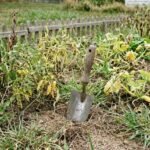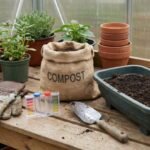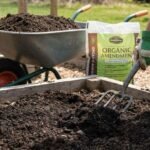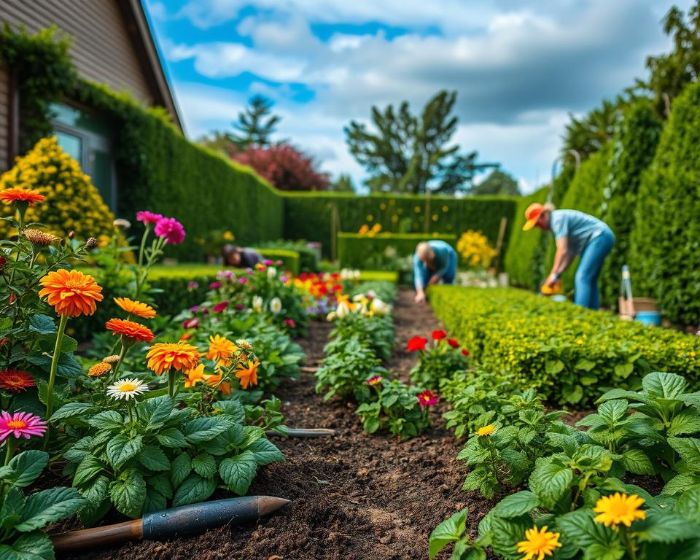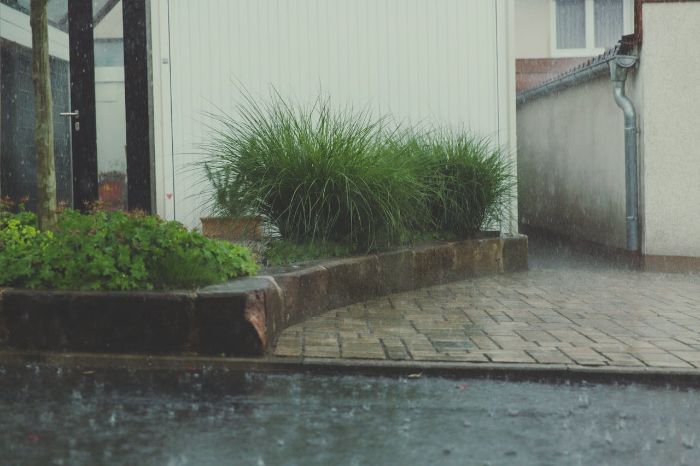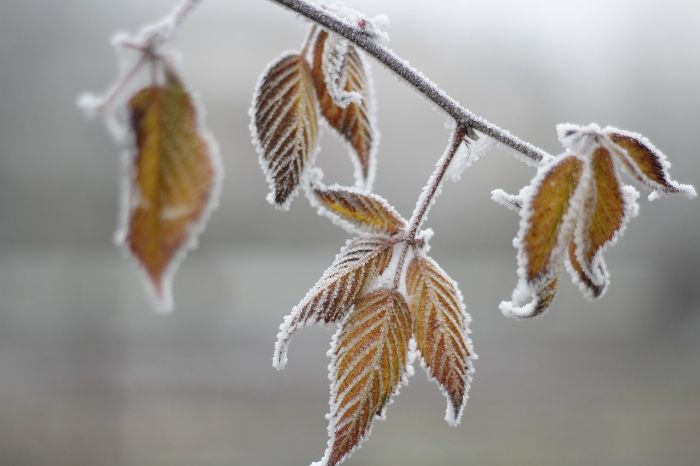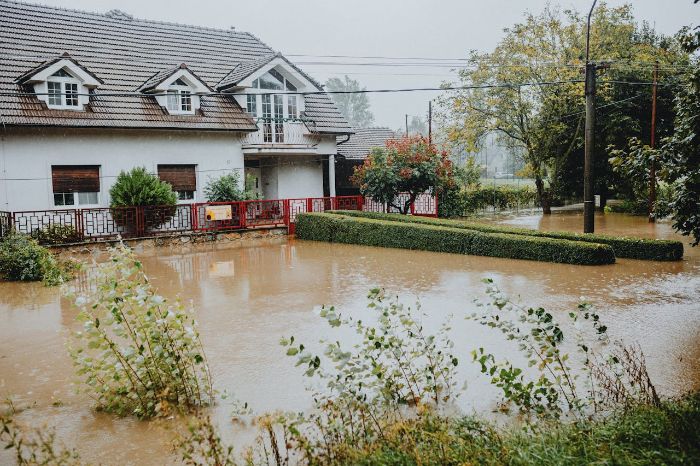Are harmful chemicals hurting your home and garden? Looking for a safe way to deal with pests? Say no to chemical pesticides and try organic pest control. It’s safe for the environment and for you. In this piece, we’ll show you the benefits of eco-friendly methods. Plus, we’ll give you an overview of natural ways to control pests.
Key Takeaways:
- Organic pest control methods are safe and sustainable alternatives to chemical pesticides.
- Using organic practices helps protect the environment and your health.
- This article will provide a comprehensive guide to organic pest control.
- Learn about the importance of eco-friendly methods and safe practices for the environment and health.
Table of Contents
About Organic Pest Control
Organic pest control is good for you and the environment. It helps keep pests away without hurting nature. This way, you stay healthy too.
It focuses on stopping problems before they start. Instead of using chemicals first, it keeps the soil healthy. It also uses plants and natural enemies to control pests.
The Importance of Using Organic Methods
Organic pest control helps the earth in a big way. It stops the bad effects of chemicals on soil, water, and air. It also makes sure good bugs and plants can thrive.
It’s also good for us. Chemicals in pesticides can make people sick. Going organic protects our health and our families too.
Overview of Safe Practices for Environment and Health
It’s important to be safe with organic pest control. This keeps the environment and us healthy. Here are some tips:
- Properly store and throw away organic pest control stuff to avoid pollution.
- Use protective gear when working with organic pesticides.
- Always follow the instructions on the products.
- Pick products that are okay for organic gardening.
- Check your plants often for early pest warnings.
By doing these things, you can beat pests the safe way. You’ll also help the environment.
Understanding Pests and Organic Management
In organic gardening, knowing about pests is key. You have to keep them in check to keep your garden healthy and growing strong. It’s all about knowing the pests you might face and how to stop them from hurting your plants. This helps your garden be a safe place for plants to grow naturally.
Common Garden Pests and the Need for Control
Some bugs and critters can cause a lot of trouble in your garden. Things like aphids, slugs, and caterpillars love to eat your plants, which makes them sick or die. By keeping an eye out for these troublemakers, you can save your garden from their harm.
Organic farmers use smart, natural ways to keep pests under control. It’s called integrated pest management. This approach focuses on stopping problems before they start. It also uses different ways to keep bugs away that don’t hurt the environment.
Principles of Integrated Pest Management (IPM) in Organic Gardening
In IPM, we use lots of different methods to fight against pests. This keeps the garden’s natural balance in check. We want to help good insects eat the bad ones and not use harmful chemicals.
IPM relies on several keys to work well:
- Prevention – It’s easier to keep pests away than to get rid of them later on. You can do this by making your garden unwelcoming to pests and taking good care of the plants and soil.
- Monitoring – Checking your plants often helps you catch pest problems early. This lets you deal with them before they get out of hand. You can do this by looking closely at your plants or using special tools to track the bugs.
- Biological Control – Bringing in friends like ladybugs who eat the bad bugs can be a big help. By encouraging these natural predators, you can keep pest numbers down.
- Cultural Control – Helping your plants stay healthy is a great defense. Pick strong plant types and give them the care they need. This makes them less tasty to pests.
- Physical Control – Sometimes, keeping pests and plants apart is the best solution. You can use barriers or pick bugs off yourself to protect your plants.
- Least Toxic Pest Control – If you still have too many pests, there are safe ways to get rid of them. Things like special soaps or natural oils help without hurting the garden’s environment.
Using these steps helps gardeners deal with pests in a friendly, natural way. It means a healthier garden for your plants and the insects that live there. You can have a beautiful garden without harming nature.
Natural Predators and Biological Control Agents
Beneficial Insects as Natural Pest Controllers
Natural pest control uses helpful bugs to keep bad bugs in line. These bugs are like superheroes, eating up the pests. Some of our heroes are ladybugs, lacewings, and parasitic wasps. They feast on aphids, caterpillars, and mites, making our gardens better places.
Using these good bugs is better for the Earth. Unlike chemicals, they don’t hurt our planet or us. They also keep our gardens diverse and in balance by supporting the food chain. It’s nature’s way of taking care of itself.

To use these bugs well, we should make our gardens bug-friendly. How? Here are some tricks:
How to Attract and Sustain Beneficial Predators in Your Garden
- Plant lots of flowers that give out nectar and pollen. Beneficial bugs love them, and it keeps them fed.
- Make places for bugs to hide and lay eggs. Add some thick plants like bushes or tall grass.
- Skip the general bug sprays. Use only what you really need, or try natural methods.
- Have a water spot like a birdbath. Bugs need water too!
- Clear out too much mulch or leaves. They can hide pests. Keep weeding to spruce up your garden.
- Try planting certain flowers near your veggies. Marigolds, for example, keep away the bad bugs and bring in the good ones.
By doing these things, we make our gardens a paradise for good bugs. They help keep the bad bugs away naturally, making our spaces healthy and happy.
Homemade Organic Pest Control Remedies
Chemical pesticides can hurt the environment and people’s health. But, homemade organic pest control is safe and cheap. You can make natural insecticides and repellents at home. Use stuff like vinegar to keep pests away and protect our planet.
Recipes for Natural Insecticides and Repellents
To fight pests, you don’t need to buy stuff from stores. Make your own natural insecticides. A mix of water, dish soap, and vinegar can kill aphids and ants. It’s easy.
Also, use things like essential oils to keep mosquitoes and flies off. What’s great is, these non-toxic mixtures won’t harm kids or pets.
Using Household Ingredients to Create Effective Pest Treatments
Making your own pest control is cool because you use things you already have. No need for harmful chemicals. Mix baking soda and sugar to attract cockroaches. This way, you keep your place safe without hurting the earth.
Be creative and try different mixes to fight different pests. This not only solves your bug problems but also helps the planet thrive.
Using homemade pest control is a smart move. You protect your space without bad chemicals. Plus, it’s good for the environment. Try these natural recipes and see how effective they are.
Cultural Practices to Reduce Pest Incidence
Gardeners can stop pests in organic gardens with key methods. These include changing where crops grow and having many different plants. Good garden clean up and caring for plants properly are also important.
Crop Rotation and Diversity to Discourage Pests
Moving crops around every year is called crop rotation. This step messes up pests’ life cycles. It lowers the chances of pests coming back and keeps them away from their favorite plants.
Planting lots of different crops can help too. Pests are less likely to find their needed plants if they’re mixed with others. This helps good bugs and bugs that eat pests to thrive too.
Proper Garden Hygiene and Plant Care to Prevent Infestations
Keeping the garden clean is important for keeping pests out. Pests love hiding in messy places and in old plant parts. Removing these can help lower the pest numbers.
Watching plants closely is also key. If you see a pest, remove it or treat the plant right away. Healthy plants that are well-fed and watered are less likely to get attacked by pests.
Using these methods and taking care of your garden can make a big difference in pest control. They help keep your plants safe and the environment healthy too.
Physical and Mechanical Pest Control Methods
Without chemical pesticides, physical and mechanical pest control methods work well. They use barriers, traps, and other means to keep pests away or get rid of them. These are great for an organic garden.
Barriers, Traps, and Other Physical Control Techniques
One main way to control pests is by using barriers. Barriers stop pests from getting to plants. Some common barriers are:
- Row covers – They go over plants to keep pests away but let in light, water, and air.
- Mesh screens – Put these around plants or over openings to block pests.
Traps also help a lot. There are many kinds, each for different pests, like:
- Sticky traps – They catch pests on a sticky material so they can’t hurt plants more.
- Pheromone traps – These use fake smells to attract and catch pests.
Using barriers, traps, and other methods can reduce pests without pesticides. For example:
- Handpicking – Take pests off by hand to control them, especially if there are only a few.
- Pruning – Cut off parts of plants pests have gotten to, to stop them from spreading more.
By doing these, gardeners can keep pests from hurting plants in a natural way.
DIY Solutions for Protecting Plants from Pests
DIY solutions are easy and help keep pests away. They use simple, everyday items to make barriers and use smells pests don’t like. These methods include:
- Homemade insect repellents – Mix garlic, neem oil, or chili powder with water and spray it on plants.
- Companion planting – Put some flowers, herbs, or vegetables together to make pests go away or to attract good bugs.
- Herb barriers – Planting herbs like mint, basil, or lemongrass around plants can stop pests.
These DIY ways to fight pests are both good and cheap, perfect for anyone wanting to garden organically.
Organic Products and Commercial Solutions
There are many organic products for pest control. They are safe and good for the earth. This makes them a top pick for people who care about the planet.
Selecting Safe and Effective Organic Pesticides
Finding the right organic pesticides matters for pest control. Always buy things that are certified as organic. They should be safe to use in gardens.
Think about what pest you have. Then, buy a product that works on that pest. Make sure to read what’s in it and how it works.
Tips for Application and Handling of Organic Products
To make organic products work best, use them the right way. Here are some helpful tips:
- Follow the directions on the label for how much and when to use the product.
- Put organic pesticides on when the air is still. This helps keep them on target.
- Wear things like gloves and goggles when the pesticides are strong.
- Keep products in their original bottles. Put them where kids and pets can’t reach them.
- Throw empty bottles out the right way.
Monitoring and Maintenance for Pest Control
Keeping track of pests is key to a bug-free organic garden. Checking your garden often helps spot pests early. This stops them from causing big problems.
This early pest finding means you can act fast. You can stop pest outbreaks before they get out of hand.
Regular Monitoring Strategies to Catch Early Signs of Pests
It’s important to watch out for pests in your organic garden. Here are some ways to do this:
- Look at Your Plants – Always check your plants for any weird signs. Pests might leave chew marks, make webs, or leave droppings.
- Set Traps – Use traps to check for pests. Sticky traps catch flying bugs. Pheromone traps draw and catch certain pests.
- Health Check on Soil – Test your soil often. Good soil helps plants grow strong and fight off pests and diseases.
- Keep a Record – Write down what you see in a garden journal. Note any pests and what you do to stop them. This helps you see patterns and choose better actions later.
Use these strategies as part of your garden routine. They help you stay on top of pest issues. This way, you can deal with them faster.
Maintaining a Balanced Ecosystem for Long-Term Control
For long-term pest control, make sure your garden’s ecosystem is balanced. A good balance helps good bugs and birds naturally control pests. Here’s how to keep it balanced:
- Increase Variety – Plant many different flowers, herbs, and native plants. This brings in helpful insects and pollinators to keep pests down.
- Offer Homes – Set up places for bees, birds, and butterflies. This gives them shelter and food, so they help keep pests in check.
- Go Light on Pesticides – Try not to use too many chemical pesticides. They can harm the good bugs and upset your garden’s natural balance.
- Use Organic Soils – Stick to organic fertilizers, compost, and mulch. They make soil healthy for plants. Healthy plants are less likely to be bothered by pests.
A well-balanced garden looks after itself better. It controls pests naturally, needing fewer pest control methods. This makes your garden not only pretty but also healthy and eco-friendly.
Challenges and Considerations in Organic Pest Control
Dealing with pests organically faces some hurdles and false ideas. It’s key to tackle these and know the real story to control pests. Knowing what makes organic pest control different helps you fight these issues and win against pests in a green way.
Addressing Limitations and Common Misconceptions
Some say organic methods are weaker than regular ones, but that’s not true. The right organic ways can beat back pests just as good. It’s wrong to think organic means losing the fight against pests.
Other people think it’s hard to find and use organic pest products. But, there are many choices if you look. Knowing how to find and use these products correctly is key.
Also, people believe organic pest control is a big time draw and hard to keep up with. It may need more checking, but it’s worth it. You’ll do less pest fighting in the long run. This happens because fewer pests will stick around when you use organic ways.
Strategies for Overcoming Challenges in Organic Pest Management
Beating organic pest problems means looking at the bigger picture. Use many tactics to control pests better without depending too much on one thing. You can mix things like changing crops and adding helpful bugs. This can work together to fight pests.
Watching pests on your plants is a must for organic care. Look closely and act early when you see signs of bugs. Doing this cuts the need for sudden, intense pest fights.
Focus on making your soil and plants strong. Healthy soil and plants are less tempting to pests. They also bounce back better if pests still show up.
Also, keep learning about organic ways to fight pests. Go to talks, ask experts, and share tips with fellow gardeners. This knowledge will help you do better against pests.

Winning at organic pest care asks for hard work, learning, and a can-do attitude. By knowing and tackling these common issues, using a mix of pest controls, and checking your gardens often, you can keep pests at bay the green way.
Conclusion – Embracing Organic Practices in Gardening
As we finish this guide on organic pest control, we see big benefits. Using organic ways in our gardens is good for us and the earth. It makes our gardens healthier and more alive without using bad chemicals.
Choosing organic pest control is smart because it lasts. We use natural ways like inviting helpful bugs and good garden habits. This keeps the garden in balance without needing chemical sprays. It also saves the bugs that help our plants grow.
Also, using organic methods makes our gardens stronger. We look out for pests early and stop them from spreading. This is done by changing where we plant things, keeping our gardens clean, and handling pests by hand. Our gardens get tougher and keep away more pests this way.
To sum up, going organic in our gardens is the best choice. It protects us and our world. We get a garden that’s full of life and fights off pests better. By using what we learned here, we help our planet stay green and healthy.
FAQ
What is organic pest control?
Organic pest control uses natural ways to handle pests in your home and garden. It’s about preventing problems first. Then, it focuses on healthy soil, protecting different plants and animals, and controlling pests with traps or other methods before pesticides.
Why is organic pest control important?
It’s vital because it helps keep your family safe from harmful chemicals. Organic methods protect the planet, keep different animals and plants safe, and ensure you and your family stay healthy.
What are the benefits of organic pest control?
There are lots of good things about using organic ways. They keep you away from dangerous chemicals and help good bugs and animals survive. This makes the water and soil cleaner. It also makes your living space safer and nicer for everyone you care about.
What are common garden pests and why do we need to control them?
Garden pests like aphids, slugs, and others can hurt your plants. This can make your garden less pretty or stop it from growing well. So, it’s important to control them to enjoy a healthy, productive garden.
What is Integrated Pest Management (IPM) in organic gardening?
Integrated Pest Management (IPM) combines many ways to control pests. It focuses on keeping pests away, checking for them often, and using many ways to stop them. This way, you need less chemicals to keep your garden healthy.
How can I monitor and maintain pest control in my organic garden?
Watch your plants for any signs of pests regularly. This will help you catch problems early. Taking good care of your garden and making a place where many different plants and animals can live also helps keep pests in check.
What are the challenges and misconceptions associated with organic pest control?
It’s true that some people think organic ways aren’t as strong as chemicals. Yet, with the right plan and knowledge, you can be very successful. It can be hard to find all the products you need. But, sticking to your plan and staying alert will help you win against pests using safe methods.
